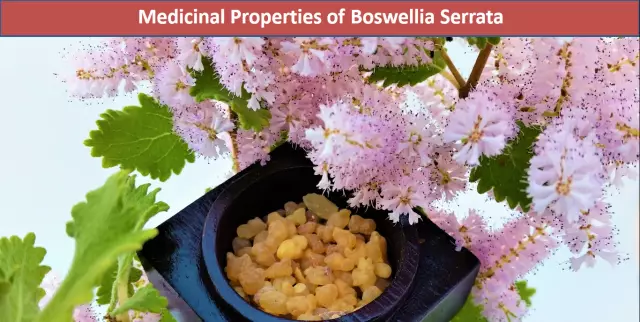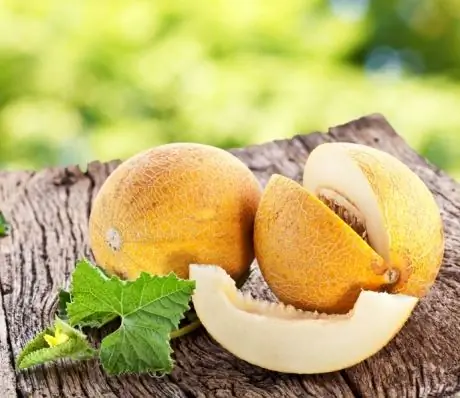- Author Rachel Wainwright wainwright@abchealthonline.com.
- Public 2023-12-15 07:39.
- Last modified 2025-11-02 20:14.
Boswellia
Instructions for use:
- 1. Chemical composition
- 2. Useful properties
- 3. Indications for use
- 4. Contraindications
- 5. Home remedies

Boswellia is a genus of low-growing tropical evergreen trees of the Burzerovy family, the resin of which - incense - has antiseptic, analgesic, anti-inflammatory, sedative and anti-arthritic properties.
Chemical composition
The main biologically active substances in the gum-resin (56% and 47%, respectively): resin and gum.
Other components:
- essential oils - a mixture of monoterpenes, alcohols, esters, sesquiterpenes and diterpenes, including cymene, verbenone, alpha and beta pinene, limonene, camphene, myrcene, sabinene;
- polysaccharides including arabinose and galactose;
- boswellic and galacturonic acids.
Beneficial features
In ancient Egypt, Boswellia was recommended for the treatment of wounds and ulcers. In the days of antiquity, incense was one of the components of the antidote of Mithridates Eupator, which, after being improved, was named "teriak" and was subsequently introduced into the pharmacopoeias of European and Asian countries.
In the Middle Ages, powdered incense was prescribed orally as a tonic; in combination with raw egg yolk, it was taken in the treatment of respiratory catarrh. As part of the patches, the plant was used to treat tumors and soften the marks that smallpox leaves. Incense mixtures were used to fumigate premises for infectious diseases.
Frankincense was used in official medicine as an antiseptic until the beginning of the 20th century. Aromatherapists have found frankincense essential oil to be an effective remedy for depression.
Recent scientific research on the plant confirms that boswellia is a potential therapeutic agent with anti-arthritic, anti-inflammatory and analgesic effects.
Boswellia's effects are due to its biologically active substances:
- terpenes - a therapeutic effect (leukocyte reactions occur, stimulating the resorption of inflammation and regeneration);
- Incensol acetate - antidepressant effect;
- Boswellic acids - antiproliferative and anti-inflammatory action, suppression of pain and immobility associated with rheumatoid arthritis (occurs due to the penetration of leukocytes into the cartilage and joint fluid).
The antiseptic effect of Boswellia essential oil is due to its penetration into cells and the effect on the metabolism of microorganisms.
A number of studies suggest that the plant extract may be effective for cluster headaches and have hepatoprotective effects.
In folk medicine, incense alcohol tincture is prescribed for the treatment of diseases of the genitourinary system, rheumatism, inflammation of the respiratory tract and gastrointestinal tract, skin diseases of fungal and bacterial etiology.
For inhalation, the resin is used in the treatment of the following diseases: acute respiratory viral infections, acute respiratory diseases, bronchitis, laryngitis, pharyngitis, tonsillitis, tonsillitis, rhinitis and sinusitis.
In case of respiratory and viral infections, it is recommended to fumigate the premises with incense. Incense smoking is effective for depression, neurosis, overwork.
Frankincense essential oil is effective against inflammation, it also helps to rejuvenate the skin, stimulate hair growth and get rid of dandruff.
In combination with other components in the composition of ointments, frankincense essential oil has a disinfecting, anti-inflammatory and regenerating effect and is indicated in the treatment of various skin diseases.
Oral administration is recommended for heavy periods, shortness of breath, asthma, cough, disorders of the genitourinary and digestive systems.
As part of aromatherapy, the plant is effective for headaches, dizziness, depression, stress, sexual dysfunction.
Boswellia extract is an active ingredient in various dietary supplements - tinctures, tablets and capsules. Also, the plant is part of the gel for osteoporosis.
Indications for use
Boswellia is shown to be used in the complex treatment of various diseases / conditions as an antiseptic, analgesic, anti-inflammatory, sedative and anti-arthritic agent.
Contraindications
A contraindication to the use of Boswellia is the presence of an individual intolerance to its biologically active substances.
Before using the plant, you should consult a doctor if you have the following diseases / conditions:
- Parkinson's disease;
- multiple sclerosis;
- psoriasis;
- systemic lupus;
- vitiligo;
- oncological diseases;
- childhood;
- pregnancy and the period of breastfeeding.
It is necessary to take into account the likelihood of developing allergic reactions.
Home remedies from Boswellia
In most cases, boswellia is used in aromatherapy, as well as a component of various dietary supplements.
Information about the drug is generalized, provided for informational purposes only and does not replace the official instructions. Self-medication is hazardous to health!






